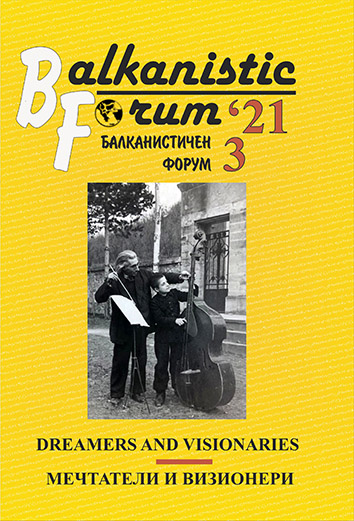Травматичният поглед на филмовата памет: принудителната асимилация във фокуса на посттоталитарното българско документално кино
Traumatic Insight on Film Memory: Forced Assimilation in the Focus of Post-totalitarian Bulgarian Documentaries
Author(s): Andronika MartonovaSubject(s): Fine Arts / Performing Arts, Film / Cinema / Cinematography
Published by: ЮГОЗАПАДЕН УНИВЕРСИТЕТ »НЕОФИТ РИЛСКИ«
Keywords: Bulgarian cinema; documentary filmmaking; forced assimilation; Muslim communities; totalitarian past
Summary/Abstract: Documentaries cover the subject of the extremely tragic processes of forced assimilation of Muslim population in Bulgaria in different ways. During the Communist regime, they feature the negative political visions. Social engineering in the totalitarian state aimed at confessional unity of the nation and this process was especially intense during the 1980s. Documentaries were a part of the government manipulative tools that targeted revival of the communist nationalism and an apprehensive play on the strings of patriotism. Cultural propaganda covered up repression, assaults, forced change of names, forced deportation, internment in prison camps, harassment of intellectuals from the Muslim community, and human rights violation.After 1989, Bulgarian filmmaking started interpreting this traumatic past in a different way, making a reassessment of history. Documentaries also took an active part in the debate on totalitarianism, using the screen to throw light on the political crimes. Beyond any dispute, one of the most painful subjects is the violence against Muslim communities that escalates to genocide. The subject of assimilation was more intensely covered during the 1990s and in the beginning of the Millennium. During the last decade, it gradually faded away and young authors today even neglect it. Although many good films have been made, we still get the feeling of insufficiency and understatement. The cinematic interpretations reactivate and question the traumatic memory, and further diagnose society. Quality documentary filmmaking always provides a multifaceted image of the past, preserves memories, and manages to aestheticize history in opposition to the trivial media images of the trauma.This paper analyses the genre and typological patterns specific for post-totalitarian Bulgarian documentaries. The focus of the study falls on leading authors, such as Maria Trayanova, Tatiana Vaksberg, Ivan Rossenov, Adela Peeva, Iglika Trifonova, Antony Donchev, Stanislava Kalcheva, Irina Nedeva and Andrey Getov, Dimitar Kotzev-Shosho. Two imagery trends are mainly identified: 1) documentary investigation with reconstruction of historical chronology and handling extremely valuable archives; 2) domination of the apprehensive portraiture genre, where personal records of events shape the picture of events in the past and track the consequences in the present. So far, Bulgarian film studies lack any full comparative study of the screen interpretation of assimilation processes before and after 1989.
Journal: Балканистичен Форум
- Issue Year: 30/2021
- Issue No: 3
- Page Range: 33-48
- Page Count: 16
- Language: Bulgarian
- Content File-PDF

